Wow! Information about the new COVID19 vaccine is coming fast and furious. As I am writing this post, I am listening to the CDC’s Advisory Committee on Immunization Practices’ (ACIP) deliberation about the vaccine and the practical recommendations regarding its use and administration. And it couldn’t be coming at a better time. Over 16 million people in the United States have been infected with the SARS-CoV-2 virus and we are nearing an extremely sad milestone of 300,000 COVID deaths in the U.S. alone. Originally, I was going to try to address the Pfizer, Moderna, and AstraZeneca vaccines (representing the mRNA and Adenovirus vector vaccine platforms). However, there is so much to consider with the Pfizer/BioNTech vaccine alone that I think I will focus on this first vaccine to be rolled out. There’s a COVID19 vaccine coming soon: here’s what you need to know – Part 3. Get ready. It’s a long one…
If you are just joining, Parts 1 and 2 of this series are well worth a read! Part 1 (found here) reviews how the immune system and vaccines work, an understanding of which will be useful in grasping how the mRNA works to provide immunity against SARS-CoV-2. Part 2 (found here) discusses the normal vaccine development process and how COVID vaccine development is moving along so rapidly. It also reviews the processes in place to ensure the safety and efficacy of the COVID vaccine(s).
Today, we will discuss the Pfizer mRNA vaccine. I think the best way to proceed is in a question and answer format. I am hearing LOTS of great questions from folks in my clinic and on social media. So, I will try to address anything and everything I can think of that would interest you. But, if I’m missing something, please reach out and I’ll try to include that in future posts. Here we go…
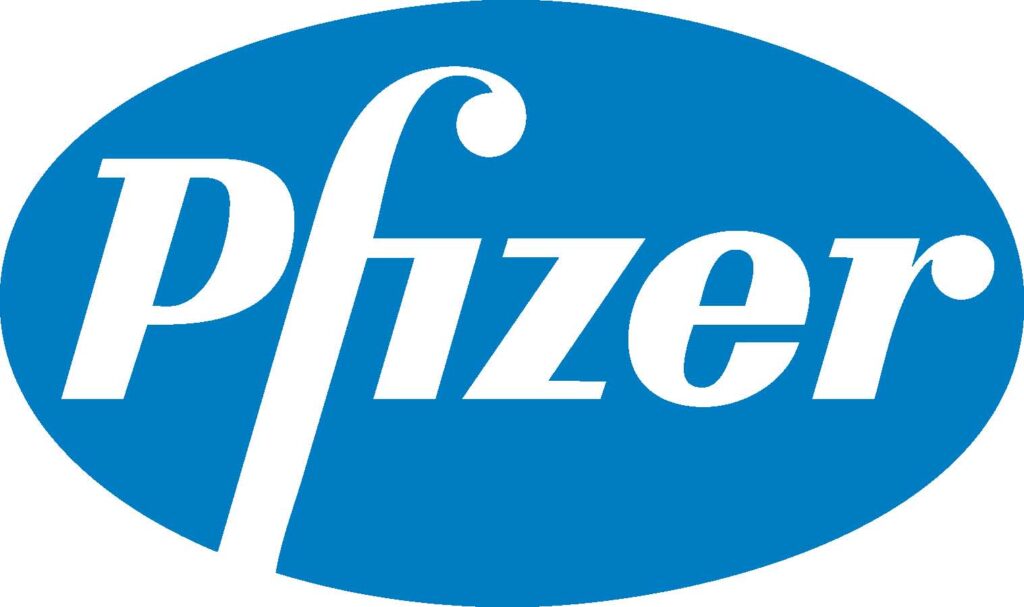
Pfizer logo from Pixy.org
General vaccine questions/concerns:
Does the mRNA vaccine work?
Yes! Of people in the study who came down with the virus, only 8 cases of infection occurred in those receiving the vaccine. 162 cases occurred in those receiving placebo. This suggests a vaccine efficacy of 95%. That is darn good! And what’s equally exciting is that it seems similarly effective across ages, genders, racial and ethnic groups, and in people with medical conditions that put them at high risk for COVID19 complications!
HOW does the mRNA vaccine work?
We know from Part 1 of this series, that vaccines traditionally use a killed or weakened virus, or piece of virus, to induce an immune response. The body recognizes it as foreign and develops antibodies against it so that, when we are exposed to the real thing at some point in the future, we are ready to fight it off before it can cause illness. The Pfizer vaccine is no different. But, in this case, it is a piece of messenger RNA (mRNA) that is being used to trigger an immune response.
Messenger RNA carries messages (hence the name) from our DNA to our cellular machinery so that the cells can make necessary proteins. In this case, the mRNA being used gives the instructions for making the SARS-CoV-2 spike protein. The spike protein is the part of the virus that allows it to attach to our body’s cells and invade, causing such damage.
If injected by itself, the mRNA, that little piece of genetic debris, would be quickly broken down in the body. In order to keep it around long enough to get it into our antigen presenting cells (APCs – please read Part 1 to learn about the function of an APC), it is surrounded by a lipid (or fatty) layer that protects it. The lipid coated mRNA then gets taken up by the APCs and instructs the APC to make the spike protein. The APC then presents the spike protein on its surface to trigger an immune response.
So, NO actual virus is being used in the vaccine. Once our bodies make antibodies to the spike protein, those antibodies stick around. Then, when we encounter the real SARS-CoV-2 virus, the antibodies bind up the virus’ spike protein so it can’t attach to our cells. Viral invasion averted! We DON’T get sick.
The mRNA vaccine has never been used before in humans. I don’t want to be a guinea pig.
I sure hear this one a lot. This makes sense. Who WOULD want to be a guinea pig? Not me! But this question implies that the vaccine is untested…and that is just not true. While this is the first mRNA vaccine to be approved for use in humans, it is not the first time use of mRNA has been studied in humans. There has actually been research on this technology since the 1990s (read here for a fascinating history of mRNA technology and the birth of BioNTech, now partnered with Pfizer, and of Moderna, making it’s own mRNA vaccine). COVID vaccine trials, involving over 70,000 participants if you combine the Pfizer and Moderna trials, are just the first to bring this technology to fruition in the form of a safe and effective vaccine.
Also, for your average person receiving a COVID vaccine, you will have the advantage of watching others go first. As a nation, we are looking to the UK as it implements its Pfizer vaccine administration program. And, as individuals, you will be able to look to your doctors, nurses, caregivers and others who will be among the first to receive the COVID vaccine. There will be a great deal of inquiry into and transparency around the experiences of those first phase vaccine recipients. So, keep your ears open!
Will the Pfizer vaccine prevent asymptomatic infection and transmission?
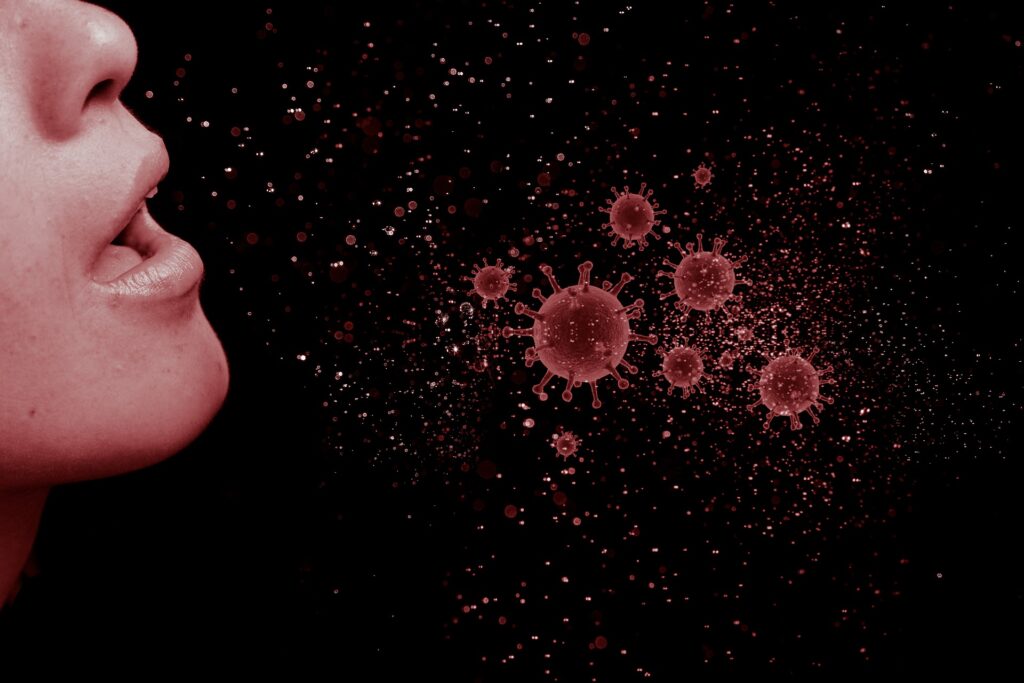
It prevents symptomatic infection, but can the Pfizer COVID vaccine prevent transmission? Photo credit Pixabay.
Oooh. Good question. Here’s one of those moments where we have to say “We just don’t know yet.” We DO know that it is very effective at preventing symptomatic and severe infection. But the answer to this question will have to be further looked into. Despite not yet having a clear answer, we can find significant reassurance in the fact that the vaccine prevents symptomatic infection. We know that symptomatic infection is more likely to spread the illness than asymptomatic infection. This makes sense, right? If you’re not coughing and sneezing you’re less likely to spread respiratory droplets to others.
How much of a role asymptomatic infection plays in the spread of disease is not fully understood. But we should not discount its potential importance. This is one reason why it will be SO vital that people continue to mask up, social distance, and sanitize, even AFTER receiving a COVID vaccine. Until we have a large proportion of the population vaccinated, which could provide Herd or Community Immunity, we will have to assume that we and others could still be transmitting virus.
RNA is genetic material. Will this vaccine be genetically modifying our cells?
Short answer? No. Usually, DNA transmits its message into RNA (a process called transcription). The opposite is less common but can occur. RNA can occasionally transmit its genetic code into DNA through a process called reverse transcription. However, this process only happens in the genetic center of the cell, called the nucleus. The mRNA of the Pfizer vaccine never makes its way into the nucleus. It gets quickly broken down after its instructions for the spike protein are transmitted.
I’ve heard the vaccine can cause fertility problems. Is that true?
Oh, this old thing again. I swear. Every time there is a new vaccine developed, someone out there claims it will damage fertility. This is simply no evidence of this. The claim was put forth by a prior Pfizer researcher who left the company in 2011 and is noted for making other faulty assertions (like the pandemic is over – news flash, it’s not!). It suggests that the spike protein of the coronavirus and a placental protein were similar enough that an antibody response to the spike protein could trigger an antibody response that would attack the placenta.
However, as immunologist and expert in maternal and neonatal immunity, Stephanie Langel, explained in her interview with the New York Times, the “coronavirus spike protein and the placental protein in question have almost nothing in common… The two proteins share only a minuscule stretch of material; mixing them up would be akin to mistaking a rhinoceros for a jaguar because they are wearing the same collar.” (No, there isn’t evidence that Pfizer’s vaccine causes infertility, The New York Times, Dec. 10, 2020)
After the vaccine, when can I get back to normal living?

Many are looking forward to getting back to pre-COVID life, like attending concerts and sporting events. Photo credit Pixabay.
Let me get out my crystal ball. I don’t think life will ever be exactly as it was before the Pandemic. Due to the loss of loved ones, some lives will never get back to “normal”. And all of us will have long term changes to our lives, both good and bad, that we will carry with us for years to come. However, I will offer my prediction for when we may get back to some semblance of our pre-Pandemic lives (kids in school, eating in restaurants, going to football games and concerts, etc.) as long as you don’t hold me to it. It’s a best guess. Deal?
I think we’ll be back to fairly normal life by next fall. This assumes we have enough vaccine to go around and assumes enough people will take the vaccine once offered. It also requires that we continue to take other preventive measures to limit spread of the virus while we are waiting on all this immunizing to happen so we can build our collective immunity.
When will I be able to get the COVID vaccine?
When you will be able to get a COVID vaccine depends on where you fall in the phases of vaccine roll out. Vaccine will first go to higher risk (either by reason of the type of work they do, their age, or their own personal health concerns) individuals. See below for the proposed phases of vaccine administration. Of course, each state or county or health system may then further prioritize people based on local needs.
After the vaccine is offered to these groups, it will then be rolled out to the general public. Whether that will be the Pfizer vaccine or the Moderna vaccine or another remains to be seen. It all depends on what vaccines are approved and how much of each vaccine is available.
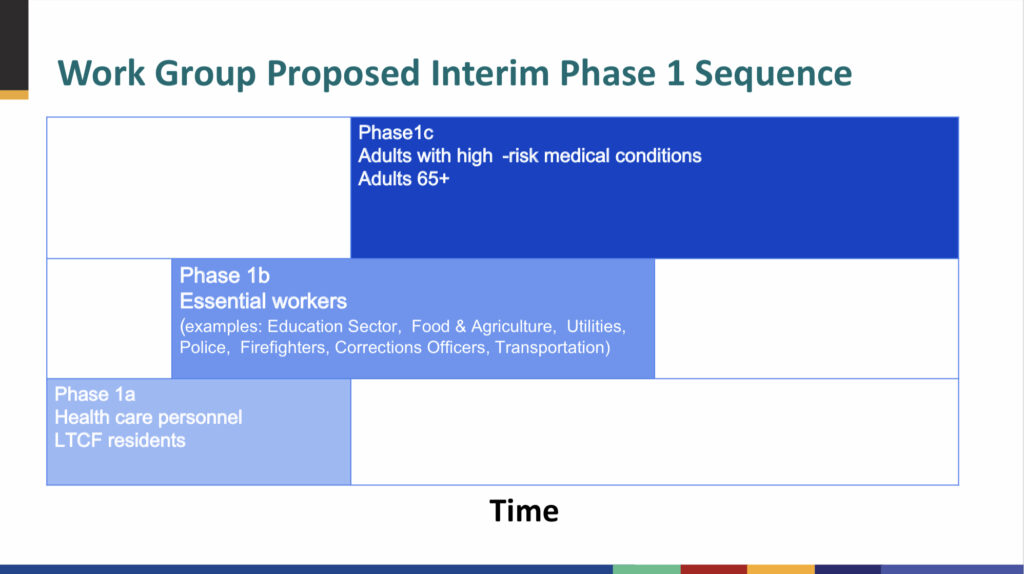
CDC phase 1a, b, and c of COVID vaccine roll out. Photo credit cdc.gov.
Where will I be able to get the vaccine?
This remains to be seen. Super cold storage (-70 degrees Celcius) will limit the locations at which the Pfizer vaccine can be given, at least in the beginning. We know that the Moderna vaccine is more stable at higher temperatures, typical of other vaccines. And further testing on the Pfizer vaccine may show it to be more stable than we initially thought. By the time the vaccine rolls out to the general public, it is more likely that you would be able to receive the vaccine at your doctor’s office, public health office, or pharmacy. But this, too, is a little up in the air.
I’ve heard that the vaccine is pretty effective even after the first dose. Can’t I just get one dose?
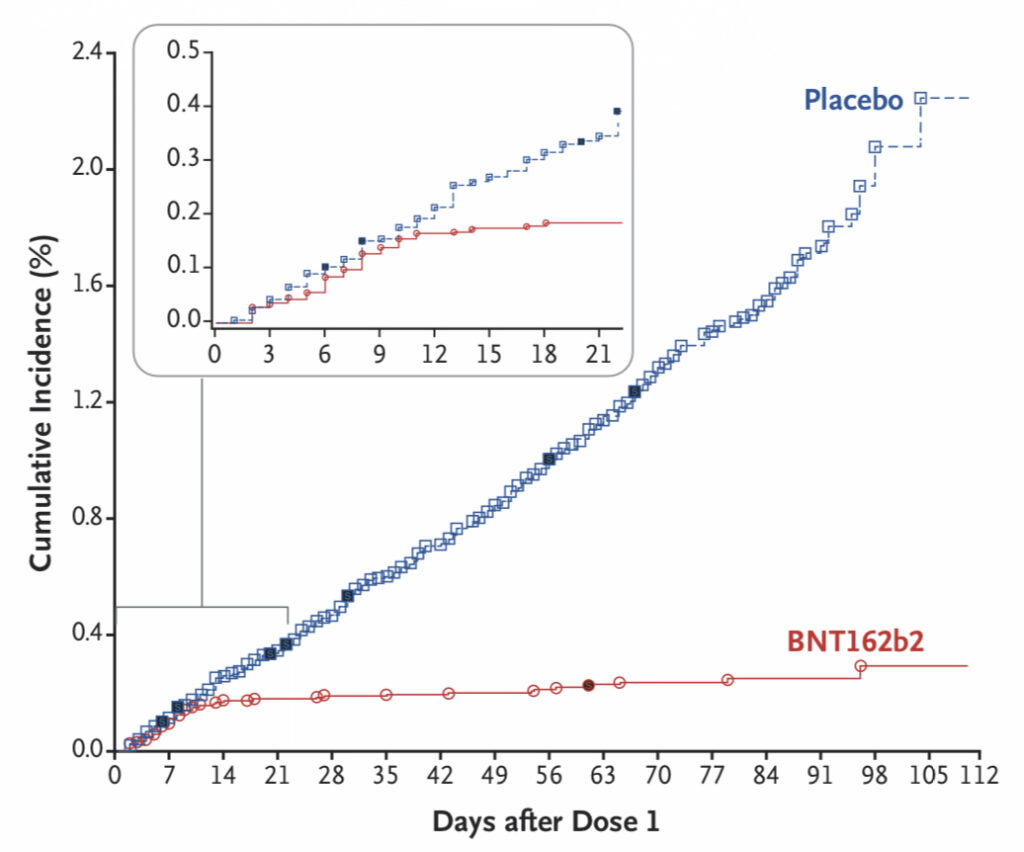
Around day 10 after immunization with the COVID vaccine, the vaccine arm demonstrated protection against infection while a significant rise in incidence of COVID infection happened in the placebo group. Photo credit NEJM.
This is not recommended. While we do see protection starting around day 10 after the first dose, studies were not done on a single dose of this vaccine. Everyone in the vaccine arm of the study got the second dose. We don’t know if or when that protection from the first dose would start to fade. What we DO know is that the effectiveness of the vaccine following 2 doses is around 95%. If you just get the one dose, you are risking incomplete and possibly lower levels of protection. Maybe some day studies will be done looking at duration of and extent of protection after one dose but, for now, we just don’t know. And I wouldn’t risk it.
How long will the vaccine protect us?
This is another question that we just don’t know the answer to. Because the vaccine is so obviously effective and safe after early testing, the benefit of release now (saving lives worldwide) outweighs the benefit of taking more time to see how long immunity lasts. We will know this eventually as more monitoring is done of study participants in the coming two years.
What side effects can I expect when getting the COVID19 vaccine?
Whenever our immune system is activated, be it by vaccine or natural infection, we feel it. When triggered by a vaccine, our immune systems can react in a way that causes mild fatigue, low grade fever or muscle aches, sometimes headaches, etc. But these symptoms are temporary (usually 2-3 days at the most, if that) and are WAY less significant and dangerous than those caused by an active infection. These symptoms are actually a sign that the vaccine is WORKING! While not pleasant, it’s actually a good thing. It beats getting COVID, that’s for sure!
The potential for this “reactogenicity” is possible with ALL vaccines and the Pfizer vaccine is no different. Below are the most common symptoms experienced following immunization with the Pfizer COVID19 vaccine. The majority of these were considered mild to moderate in severity. They generally occurred within 1-2 days after vaccination and resolved within 1-2 days of onset.
Local reactions: injection site pain, redness and swelling
Systemic reactions: fatigue, chills, headache, fever, diarrhea, joint and muscle pain
Were there any more serious side effects seen in the Pfizer study?
While not “side effects” (the term “side effect” suggests that there is a definite association between the vaccine and the outcome), per se, there were some interesting occurrences during the study that happened a bit more commonly in the vaccine arm than in the placebo arm that warrant further monitoring. These include appendicitis, lymphadenopathy (swollen lymph nodes), and Bell’s Palsy (a typically temporary weakness in the facial muscles on one side that can appear like a stroke but is not a stroke).
It is important to note that there was NO increase in cases of these conditions above what is typically seen in the population (called the background rate of disease). While these occurrences were not frequent enough to signal any worry over the vaccine, they are certainly outcomes that will be closely monitored for after the vaccine is used more broadly.
Is there anyone that should NOT get the Pfizer mRNA vaccine?
The only contraindication for the Pfizer vaccine currently is in persons with any serious allergic reaction to a component of the vaccine or to a prior dose of the vaccine, and in those experiencing an active COVID infection. A contraindication, in vaccine terms, is different than a precaution. Precautions are much more common.
Precaution means that a person could still receive the vaccine but should first have a discussion with their medical provider about the risks and benefits of getting that vaccine. There may not be enough information about their particular condition/concern to fully reassure them regarding safety. Currently the precautions would include use in those with severe allergic reactions, pregnant and lactating women, and those who are immune suppressed.
What are the ingredients in the Pfizer vaccine so I’ll know if I can get it or not?
Please note that, while you will see some long chemical sounding names here, what’s included in the vaccine is very basic stuff: the mRNA, fats, sugar, and salts. Please don’t be put off by the chemical names. In science, EVERYTHING has a chemical name. For example, water (H2O) is dihydrogen monoxide (“di”, meaning two, hydrogen molecules and “mono”, meaning one, oxygen molecule). Here’s the ingredients (also called excipients) list:
- mRNA
- Lipids (fats):
- (4-hydroxybutyl)azanediyl)bis(hexane-6,1-diyl)bis(2-hexyldecanoate)
- 2 [(polyethylene glycol)-2000]-N,N-ditetradecylacetamide
- 1,2-Distearoyl-sn-glycero-3- phosphocholine
- cholesterol
- Salts:
- potassium chloride
- monobasic potassium phosphate
- sodium chloride
- dibasic sodium phosphate dihydrate
- Sugar:
- sucrose
Group-specific questions/concerns:
Pregnant and lactating women
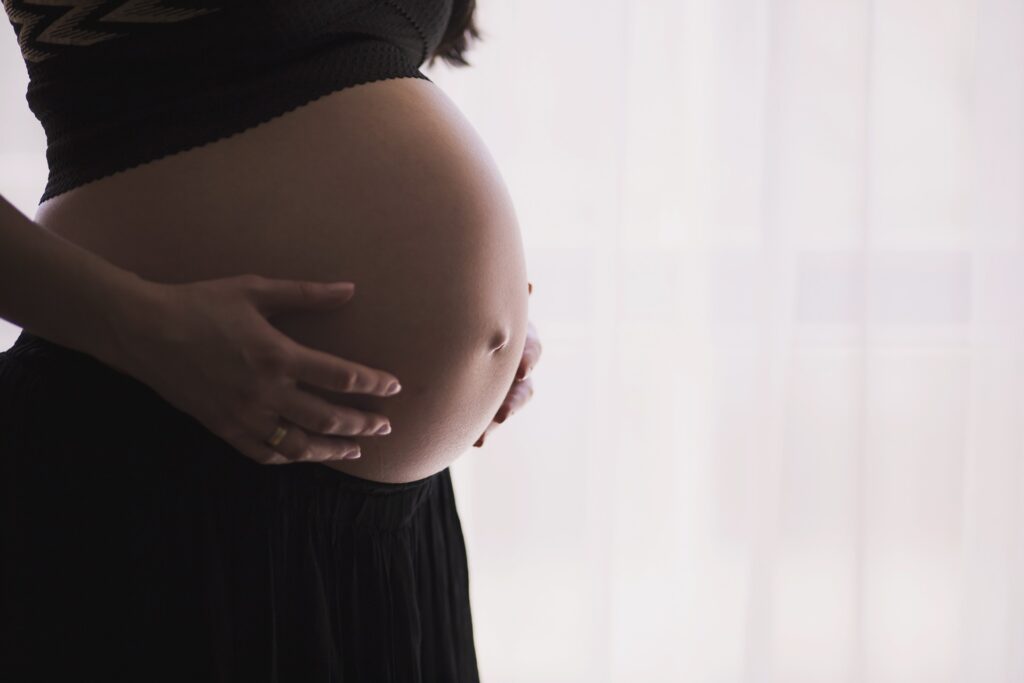
Many have questions about the safety of the COVID vaccine in pregnancy and breast feeding. Photo credit Pixabay.
Whether to take this vaccine when one is pregnant or breast feeding is a big topic of discussion. As with all brand new vaccines, pregnant women are not included in the initial trials. Only after a vaccine is proven safe in non-pregnant patients would a study in pregnancy be considered. The decision to get this vaccine if pregnant will be a more pressing one for our medical and hospital-based workforce, the large majority of whom are female. For many, they are are in high risk situations, coming into contact with COVID on a regular basis. The decision will have to be one between the woman and her physician, weighing theoretical risks vs known benefits.
As it happens, there were pregnancies in the study group that occurred AFTER the vaccine was given. 23 women became pregnant during the study, 12 in the vaccine arm and 11 in the placebo arm. The only adverse events noted thus far (spontaneous abortion and retained products of conception) occurred in the placebo group. These women will be followed closely, as will their infants, over the 2 year course of the study.
Likewise, there will be pregnancy registries for women in the general population who get vaccinated and later find out they were pregnant or whom soon after become pregnant. We will be able to do retrospective analysis to monitor for any unwanted pregnancy effects or effects on the baby. Additionally, further studies including pregnant women are planned. More to come on this front…
- Will the vaccine be recommended for pregnant women?
- Currently, there is a precaution for use in pregnancy (see discussion of precautions above). We just don’t have enough information yet to recommend with confidence.
- Will the vaccine be recommended for women who are breastfeeding?
- Again, there will be a precaution listed for breastfeeding women as they were not specifically included in the trials. But the risk here is really low. This is not a live virus vaccine so infection of the mom, and/or the baby, is not a risk. The only concern I can think of would be potentially a vaccine-related fever in mom that may result in a decrease in breast milk production.
- Is there any recommendation about timing of pregnancy AFTER vaccination?
- If planning pregnancy, it would seem prudent to complete the vaccine series BEFORE hand so that the mother is protected against COVID for the course of her pregnancy. However, there is currently no guidance on how long one needs to wait after vaccination before becoming pregnant.
Children

We also want to know that this vaccine is safe for use in children. Photo credit Pixabay.
As discussed in Part 2 of this blog series, vaccines are first tested on adults and then, once proven safe, will be tested in younger and younger children. Currently, Pfizer only has enough data on persons over 16 years of age to demonstrate safety and efficacy in this group. However, studies involving children 12 and older are ongoing and studies involving younger children will likely be forthcoming.
For now, children under age 16 will not be recommended to get the vaccine. Though less common, the SARS-CoV-2 vaccine can seriously negatively affect children. And they, of course, can transmit the virus to others. So it will be important to talk to our children about continuing to mask, sanitize and practice social distancing… at least until more people are vaccinated and/or the vaccine is approved for children.
Immune suppressed persons
- Will the mRNA vaccine be safe for me if I am immune suppressed?
- Yes! The only vaccines that people who are immune suppressed should not take are those that are live-attenuated (weakened) virus vaccines. The Pfizer vaccine is not one of those vaccines and should be safe for those who are immune suppressed.
- Will the mRNA vaccine be effective for me if I am immune suppressed?
- When one is immune suppressed (be it naturally or through taking immune suppressive medications), their immune system does not respond as strongly to immunization. So, you may not get as much benefit out of the vaccine as someone who is not immune suppressed. However, as someone who’s immune system is weakened, you are also at much higher risk of complications from COVID or other infections. So, any little bit of protection, even if it’s not as robust as it might otherwise be, would be helpful.
- Will the mRNA vaccine cause any flares in my underlying disease?
- Well, THIS is really the question. This is why there is a precaution for use of the Pfizer vaccine in immune suppressed people. While there were people with immune suppression in the study, there were not enough to say definitively that the vaccine may not trigger a flare of the underlying disease. The vaccine seems safe in this group but, whenever we can’t say with more certainty, a precaution is given. Again, a risk/benefit discussion needs to be had with your medical team to determine if this vaccine is right for you.
People who currently have or have already had COVID19
- If I already had COVID, should I still get the vaccine?
- We know that the immune response to a COVID infection lasts for likely at least 3 months but we have less data for any time period after that. We have seen people get COVID twice and so we know that immunity can lessen over time. This is why the vaccine is recommended, even if you already had a COVID infection.
- If I am actively sick with COVID, when is it ok to get the COVID vaccine?
- The current guidelines state that you wait until you would otherwise be able to discontinue your isolation/quarantine. See here for current rules on discontinuing quarantine after a documented or suspected COVID infection.
People with allergies
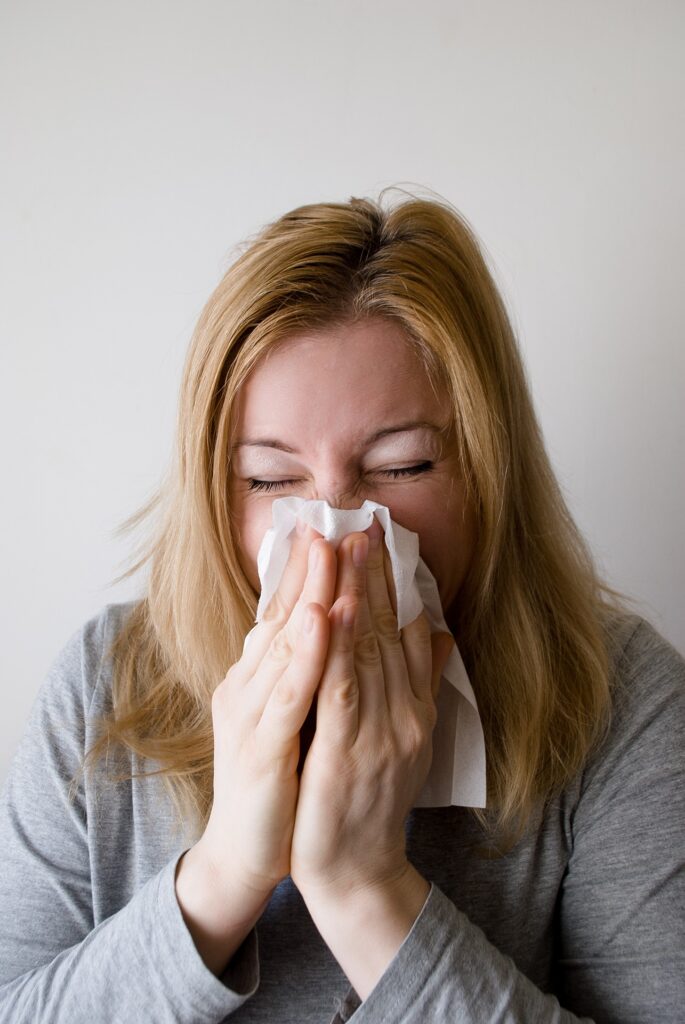
We’ve heard of rare severe allergic reactions following the Pfizer COVID vaccine. What does this mean for me? Photo credit Pixabay.
- I’ve heard that the vaccine can cause anaphylaxis. Do I need to be worried?
- Anaphylaxis is an allergic reaction that causes trouble breathing. This occurred in two medical workers who received the vaccine in the UK. Both were people with known severe allergies, severe enough to carry an Epipen. Both have recovered. People with known allergies to components of the vaccine or who had severe allergies to any vaccine were excluded from the Pfizer study. It is not known, at least not to me, how many participants had other lesser allergic reactions (like seasonal allergies or non-serious food allergies, for example).
- Allergic reactions among trial participants were closely monitored. There were 137 (0.63%) participants in the vaccine group and 111 (0.51%) participants in the placebo group who experienced symptoms potentially representing an allergic reaction. The incidence was low and not significantly different between the two groups.
- I’ve heard the Pfizer COVID vaccine won’t be recommended for people with allergies. Does that mean I can’t get the vaccine?
- Not necessarily. This will take a discussion with your medical provider. It will depend on what type of allergy you have and how severe the reaction is. Hopefully, the CDC will give us clear guidance on and definition of what constitutes a “severe allergy”.
- There are steps that can be taken to minimize the potential for allergic reactions, such as taking antihistamines prior to vaccination. But this is not something I would do without prior discussion with your physician.
- IF someone with a history of known severe allergic reaction is given the Pfizer vaccine, they will need to be monitored for 30 minutes after the vaccine.
- ALL vaccine recipients, per current CDC recommendations, should be monitored for 15 minutes after receiving the vaccine. And ALL clinics offering vaccination will have to have treatment for severe allergic reactions on hand. When these type of reactions happen, they usually happen quickly. And a medical setting is the right place to be.
Communities of color

A diverse racial and ethnic representation in vaccine studies is vital to proving safety and efficacy in these populations. Photo credit Pixabay.
We know that communities of color are disproportionately affected by COVID. People from these communities are more likely to be essential workers or to have limited options to work from home, putting them in harm’s way. They are more likely to live in communities where access to medical care is inadequate. They are more likely to have food insecurity and economic instability. For these and other complex reasons, they are also more likely to suffer from medical conditions that place them at higher risk for complications of COVID illness.
Over the years, communities of color have been neglected and taken advantage of by the scientific and medical communities meant to serve them. Historically, they have been under-represented in scientific research, providing less confidence that medications and vaccines and other medical interventions are safe and effective for them. As members of the scientific and medical communities, we must acknowledge this neglect and harm. We must work to make amends and do better going forward. Equity and inclusion and fairness in science and medicine are imperative to regaining the trust of these communities.
I can’t speak for all of the trials underway (there are over 100 around the world). But Pfizer has posted its diversity profile for the COVID vaccine and these figures represent a significant improvement compared to prior vaccine trials. There is still a long way to go, of course. But, racial and ethnic diversity in the trial were an important focus for researchers.
- Were communities of color represented in the Pfizer COVID19 vaccine trial?
- Here are Pfizer’s COVID vaccine racial and ethnic diversity profiles for its study sites in the US and abroad.
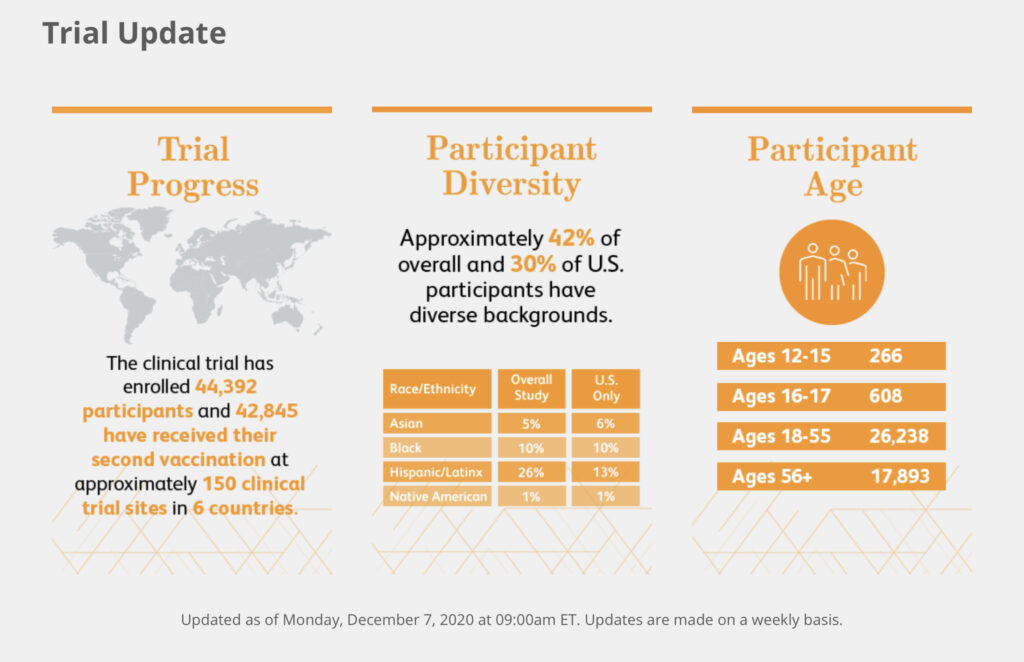
Pfizer vaccine participant diversity. Photo credit Pfizer.com.
- Were there any differences seen in safety or effectiveness in persons of color vs white participants?
- No, the vaccine seemed equally effective and safe across race and ethnicity groups as well as across genders, age groups, and groups with medical comorbidities.
And finally….
What’s the most common question I get asked?
“Will YOU get the COVID vaccine?”
The answer…
”Absolutely. 100% yes!”
I have confidence in science and so should you. We have seen advances and efficiencies in the vaccine development process that will undoubtedly alter the vaccine landscape for years to come. We are getting better, not cutting corners. This vaccine offers great promise and I, for one, am ready to roll up my sleeve!
Check in again next time for COVID19 vaccine coming soon: here’s what you need to know – Part 4. We will tie up any loose ends, answer more questions that may pop up, and maybe touch on some of the other vaccine candidates coming down the pike. Until then…
PS – if you are interested in receiving regular installments of my blogposts, enter your email in the “subscribe” field on my home page. Thanks for following along!
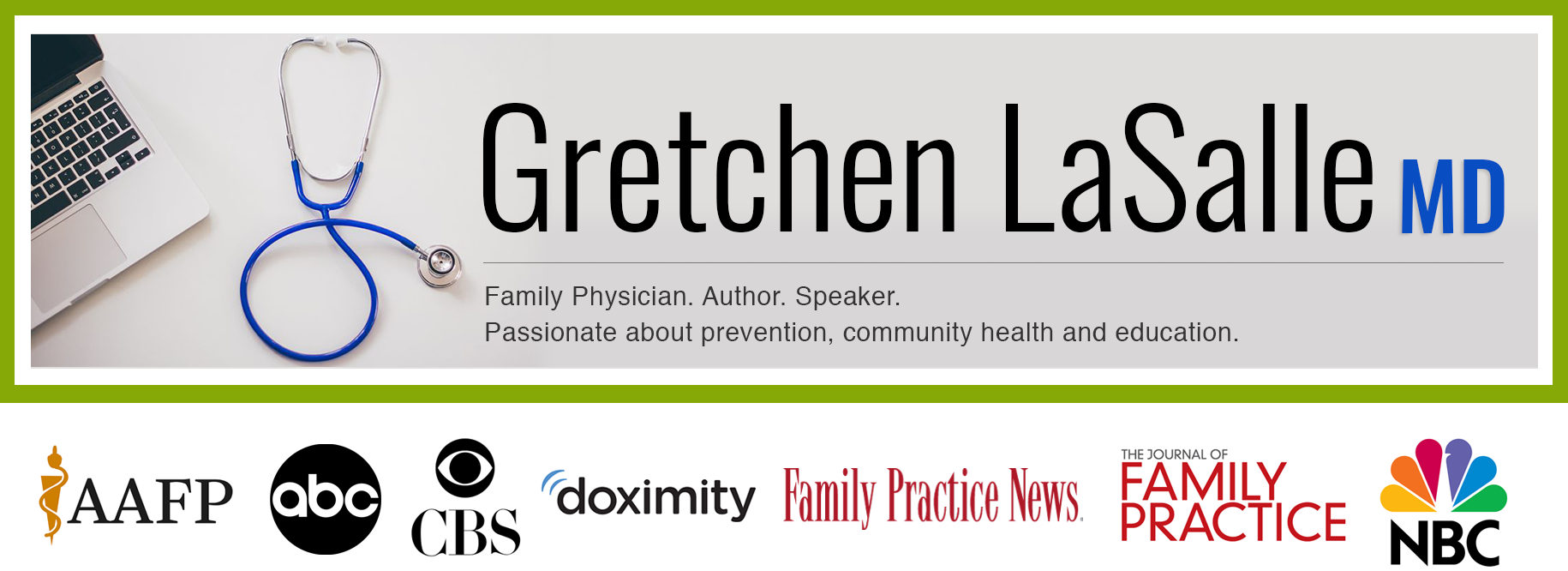

Awesome, informative post as always! Thanks, Dr. Gretchen!! Sharing with my friends, family & patients.
Hi Dr LaSalle,
Question. I am 66 in good health with no preconditions. I volunteer driving refugees from the airport to homes we have setup. The last year there was almost no pick ups and the staff did the driving while I was quarantining. This year should be a lot different with quite a bit more as the year progresses. Would it be safe for me to pick them up at the air port after my vaccination? I would be masked driving and at the airport too. I doubt they would be vaccinated as most of them come from refugee camps, but will be masked also.
Bill
Hey Bill,
There’s no guarantees and a lot of potential variables but I would say, if you have had the vaccine, are healthy and are without any concerning symptoms, if all are masked and if you can ideally keep windows open, I’d think it would probably be relatively safe. You may want to talk to your personal physician about it closer to when this opportunity presents itself. And thank you for your work with the refugee community!
Excellent post!
Thank you so much!!
Can you clarify this statement? What negative effects?
“Though less common, the SARS-CoV-2 vaccine can seriously negatively affect children”
Thanks for your question, JJ. I’ll update the blogpost with a link. We’ve seen children die of COVID19 (more than typically die of the flu each year, which is not an insignificant number in and of itself) and have seen others develop a condition now termed Multi-system Inflammatory Syndrome in Children (MIS-C). Here is a link about ongoing research into this condition: https://www.nih.gov/news-events/news-releases/nih-observational-study-coronavirus-infection-multisystem-inflammatory-syndrome-children-begins